Editor’s Staff
The Wishing-Table, the Gold Ass,
and a Cudgel in a Sack
or The Tailor’s Three Sons
Some weeks ago, Postcard History’s contributor, Eleanor McCrackin presented a Postcard History lesson on the Brothers Grimm accompanied by a set of postcards that illustrated The Town Musicians of Bremen. The artwork on those cards was that of Oskar Herrfurth, who worked tirelessly for the German printing concern UVACHROM.
Georg Mühlberg (1863 – 1925) was another German draftsman and illustrator who worked for Uvachrom. He was born in Nuremberg, Germany and was known as a successful magazine artist and the illustrator of several children’s books. Herr Mühlberg’s work for Uvachrom consisted of two six-card sets: The Seven Swabians and The Wishing Table.
Swabia is a region in the Schwarzwald (The Black Forest) in the mountains of southwestern Germany. The tale of the seven Swabians is one with a moral that teaches that cowardly behavior never ends well. That you must profit from your errors and own your mistakes. The tale was the basis of a once-popular three-act folk-opera by the Austrian Carl Millocker, but never achieved general popularity.
The story of the tailor’s three sons or the Wishing Table, has a similar moral but with a happier ending. When the Grimm brothers discovered the tale, they included it in the second (1857) volume of their Children’s and Household Tales.
* * *
The full title is The Wishing-Table, the Gold Ass, and a Cudgel in a Sack and it goes like this: There once was a tailor who had three sons. The father and sons enjoyed life because they were well fed by the milk of a goat. The tailor declared that the goat must have the very best food, because if the goat eats well the milk would be better. It was the task of the three sons to make sure the goat ate only the best and they took turns seeing to the daily routine.
The oldest son was first at the given task and took her to a churchyard where only the finest herbs could be found. As the sun set and it was time to go home, the boy asked, “Goat, hast thou had enough?” The goat answered, “I have eaten so much, Not a leaf more I’ll touch, meh! meh!”
However, when they returned home the goat claimed the opposite, causing the tailor to get upset and drive his son out of the house.
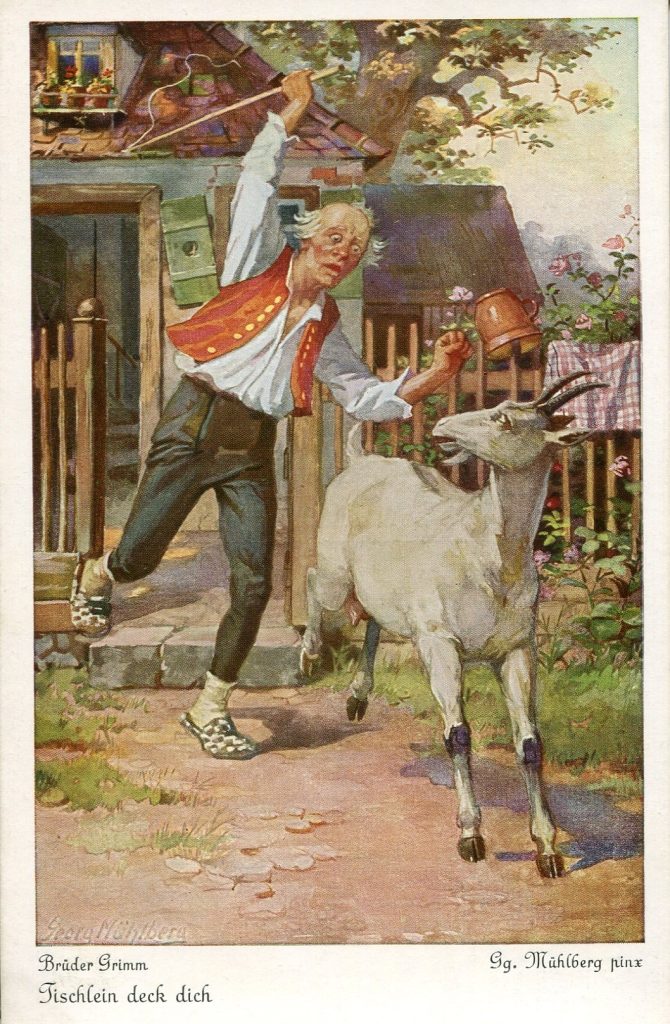
The next day the same thing happened to the second son, and then the third son. Finally the father goes out to feed the goat himself. It was then that he discovered that the creature always claimed it hadn’t eaten enough, and he realizes he has misjudged his sons. He takes a razor, shaves the goat bare and uses his whip to chase it from his home. The tailor is left alone longing for his sons’ return.
While the father waits, he remembers that his first son went to a maker of furniture to learn the craft. After his service his master gave him a magic table as a sign of gratitude. Whenever the lad said, “Table, Deck Yourself” the table decks itself with the finest food and wine. The son decides to travel home and show his father what he learned and earned. On his way he visits a local inn, where he demonstrates the powers of the magic table. At night the inn keeper steals the table and switches it for a normal table, without the son being aware. When the son arrives home and tries to show the powers of the table to his father nothing happens, which upsets his father once again.
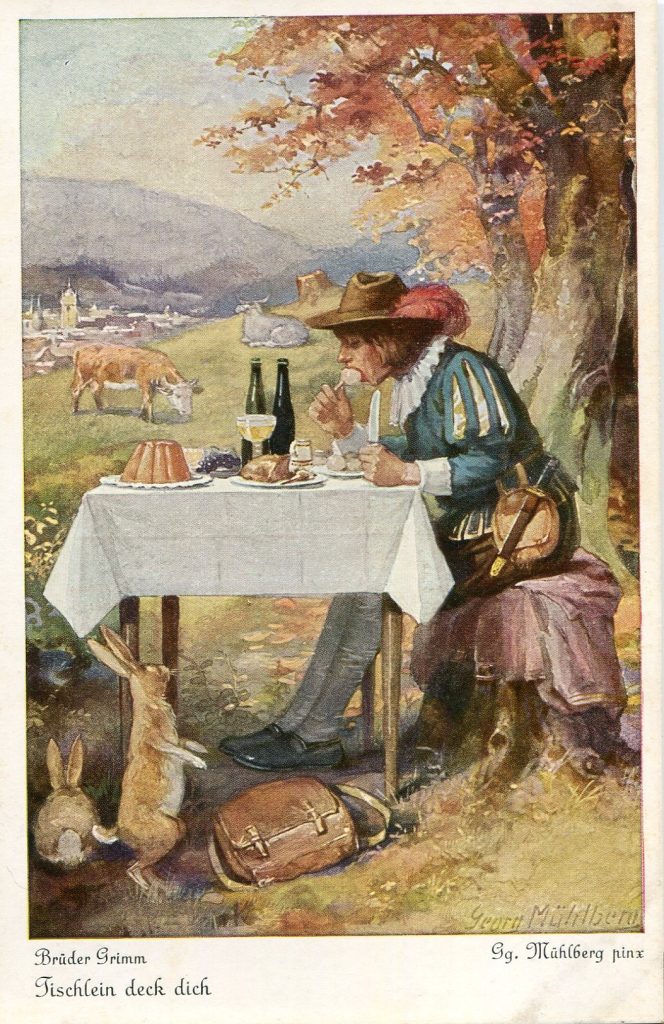
The second son goes to work for a miller. His master gives him a magical ass who is able to produce gold out of its mouth whenever he hears his new owner say, “Bricklebrit!” Just like the oldest son, the second son decides to travel home and happens to visit the same inn his brother did. He too shows the innkeeper the skill of the animal, and again the innkeeper steals the ass at night and replaces it with a normal donkey. Like his brother, the second son is unaware of what happened. When the son arrives home and tries to show the power of the ass, instead of gold pieces it is only the ordinary droppings of a donkey. Again, the father is angry.
The third son went to work for a woodturner and is given a magic cudgel in a bag. Whenever someone is unjust, the owner of the cudgel just needs to say: “Cudgel, out the sack!” and the object will start clobbering the wrongdoer. Only when the owner says: “Cudgel, in the sack!” will the thing return to the bag.
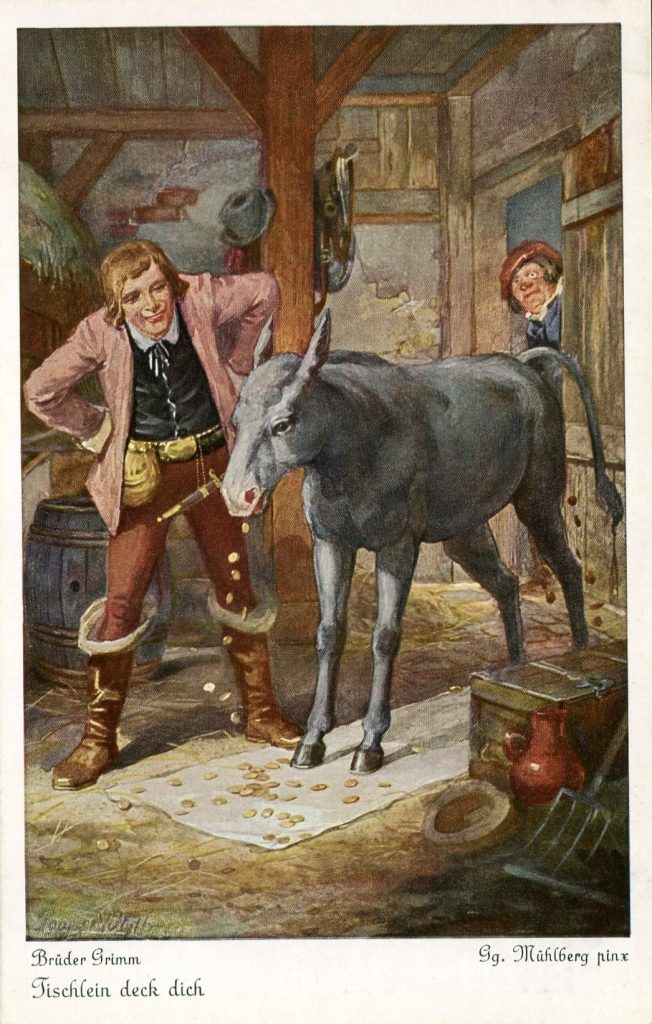
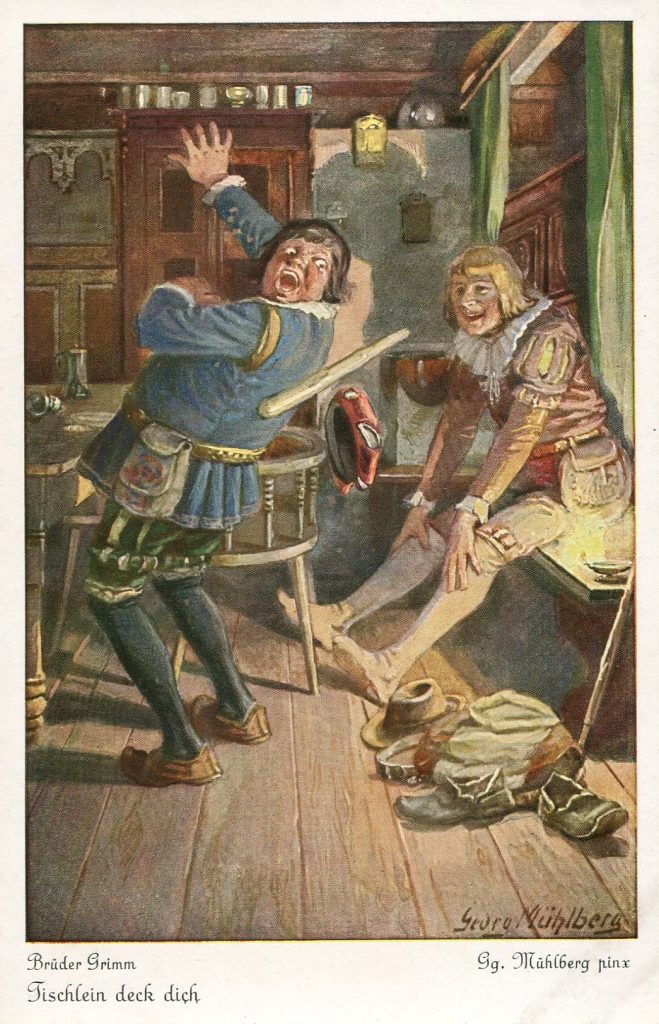
Just like his brothers, the third son visits the same inn, because he learned from their letters what had happened. Instead of demonstrating the powers of his possession he deliberately remains vague about it, making the inn keeper curious enough to go out at night and try to see the contents of the bag. Anticipating this, the son orders the cudgel to beat the inn keeper until he returns everything he has stolen.
When the son returns home with the table, donkey and cudgel he tells his father what had happened and demonstrates the powers of the three objects. His father finally makes peace with his sons, and they all live a rich life ever after.

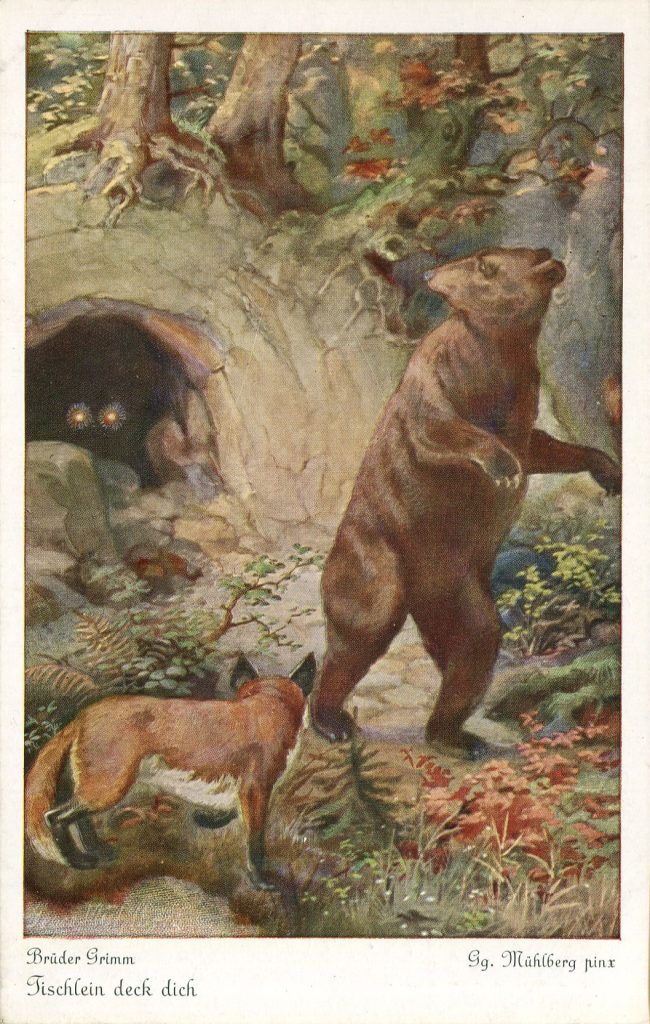
At the end, the story also informs the reader what happened to the goat. The shaven animal went to hide inside a fox hole. When the fox returned home it was scared away by the goat’s beady eyes. The fox asks a bear for help, but he is also too frightened to investigate. Finally, the fox and the bear ask a bee to sting the goat. The sting forced the goat to run away in pain and she has not been heard from since.
* * *
Georg Mühlberg was not the only early 20th century artist to illustrate The Wishing Table. Arthur Rackham, the famous British artist did the illustrations for a new English language edition of Grimm’s tales in 1917. Rackham became famous after he illustrated Peter Pan, Alice in Wonderland, Gulliver’s Travels, and Rip Van Winkle.
Thank you for these articles! Please keep up the great work.
Anyone interested in fairly tale postcards should get “Tales of Wonder”, by Jack Zipes, published 4 or 5 years ago by the University of Minnesota Press. Prof. Zipes is a leading academic authority on fairy tales and has collected thousands of postcards on the subject. It’s an interesting topic and a great postcard-themed book.
A wishing-table would be most welcome in these days of ever-rising food prices, as well as a boon to anyone too unskilled or lazy to cook a sumptuous repast.
This is an excellent article. Thank you for it.